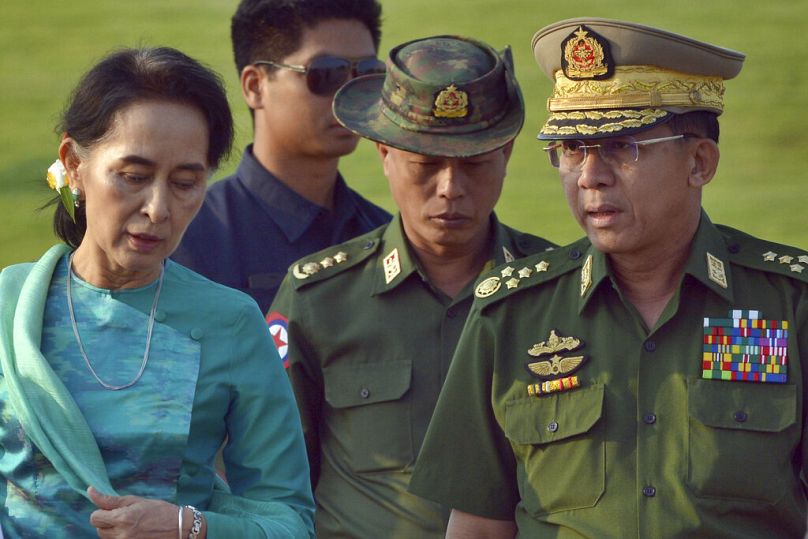Myanmar's military seized power on February 1, arresting Suu Kyi and scores of others, and plunging Myanmar into turmoil.
A Myanmar court on Monday sentenced the former head of the civilian government Aung San Suu Kyi to four years in prison for inciting public unrest and violating health rules related to COVID-19.
The military later said her sentence was reduced to two years.
The Nobel Peace Prize winner's National League for Democracy party won a landslide election victory just a year ago.
The win put her and her party back in office for a second consecutive five-year term after decades of army-dominated rule.
The military seized back power on 1 February, arresting Suu Kyi and scores of others, and plunging Myanmar into turmoil after a brief period of stability and promises of more democracy.
**"**The European Union strongly condemns this politically motivated verdict, which constitutes another major setback for democracy in Myanmar since the military coup on 1 February 2021," said Josep Borrell, the EU's foreign affairs chief.
"The military’s actions show complete contempt for the will of the people, expressed clearly in the November 2020 elections."
The European Union has called for the release of political prisoners as well as those detained during the coup.
Human rights group Amnesty International condemned the "court’s farcical and corrupt decision."
"The harsh sentences handed down to Aung San Suu Kyi on these bogus charges are the latest example of the military’s determination to eliminate all opposition and suffocate freedoms in Myanmar," said Amnesty's deputy regional director for campaigns Ming Yu Hah.
"The court’s farcical and corrupt decision is part of a devastating pattern of arbitrary punishment that has seen more than 1,300 people killed and thousands arrested since the military coup in February."
Highs and lows
Suu Kyi’s career has been marked by highs — winning the Nobel Peace Prize — and lows — spending 15 years in house arrest under a previous military government.
Her father was Aung San, the country’s independence hero. His assassination in 1947 just months before Myanmar — then called Burma — was freed from British colonial rule prefigured the country's extended turbulence.
Suu Kyi in early adulthood led an expatriate’s life after marrying Oxford University scholar Michael Aris, with whom she had two sons.
She plunged into her country's politics in 1988 when she returned to her homeland to take care of her dying mother as large protests were breaking out against the military dictatorship of Ne Win. She helped found the National League for Democracy, but paid a price in 1989 when she was put under house arrest, where she would spend 15 of the following 22 years.
Her fame spread in 1991 when she was awarded the Nobel Peace Prize, but it took 21 years until she won a seat in a parliamentary by-election.
A landslide victory in a 2015 general election put her party in power. Barred from becoming president under constitutional rules drafted by the military, the post of state counsellor was created to allow her to become the country’s leader.
International admirers of her struggle for democracy dropped away after she went to the International Court of Justice in December 2019 to defend the army's brutal 2017 counterinsurgency campaign against the Muslim Rohingya minority in the western Rakhine state.
In the November 2020 general election, her party won even more seats than it did five years earlier. But the military disputed the vote and forced her from power.
Watch the full interview with Human Rights Watch's deputy director of the Asia Division, Phil Robertson, in the video player above.












